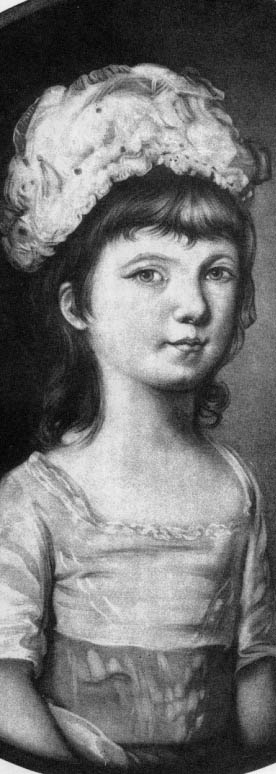Making a good marriage was the most important if not only goal of
upper-class girls in the 18th century. Thus, the focus of a young
aristocratic woman's education was centered around making her as marriable
as possible. These girls were often, as in Titania's case, educated by
French or English governess or by waiting gentlewomen. These governesses
often did have much education themselves and even if they had, a young
woman who knew too much was considered unfeminine. A girl's education
often included basic reading,and writing as well feminine
activities such as needlework and dancing. Girls might also read
Shakespearean
plays and poetry. During earlier times, even these most
basic academic skills were not commonly taught to upper-classes girls.
However, when young aristocratic men went on the grand tour they met young
French women who could have conversations about
music, art, and literature. By comparison, English gentlewomen, seemed
dull and uninteresting because they could only talk about balls and
fashion. As a result, British mothers thought it wise to educate their
daughters enough to compete with these French women in the marriage
market.
However, some upper-class and middle-class girls went to boarding
schools called
seminaries, although many aristocrats looked down on these
institutions. One obsever remarked that semenaries were simply places
"where girls acquire nothing but the foibles, insipidities and delrium of
their betters."
3 Just as at home with governesses, these girls were taught next
to
nothing at these semenaries. In addition, no training was required for the
teachers who ran these seminaries. The women who ran and taught at these
institutions were, with few exceptions, ridulously underqualified. Thus,
these places were refuges for "the impecunious, the unfortunate, the
ignorant adventuress [and] the lady's maid out at elbows."
4
A scene at
a prominent London girls' seminary
is here described."Mrs. Letitcia Tattle, who with no qualification save
her reduced circumstances, instructed a crowd of voluble, young
creatures in the fashionable phrases and compliments to use at teatables
or on visiting days."5
At seperate shools, their male counterparts
were taught Latin, Greek, algebra and history. These subjects were
considered particularly unfeminine and instruction was confined to more
ladylike pursuits. These included learning to play instruments
and sewing. Singing was also included in the curriculum because many
gentlemen liked to be sung to sleep following dinner.
There were, however, highly educated young women during the Eighteenth
Century. These young ladies were usually upper-class and had progressive
parents. However, these young women either had to hide their intellectual
prowess or risk being outcasts in high society. This intellectual "elite
was neither particularly wanted by society nor specailly trained. These
outstanding women were the results of accidental circumstances or in
exceptional cases of specific abilities."6
The Edgar Girls by A. Devis,
1762.
Click on Titania's picture to return to her
bio. Click on the kiddies to return to the main page

